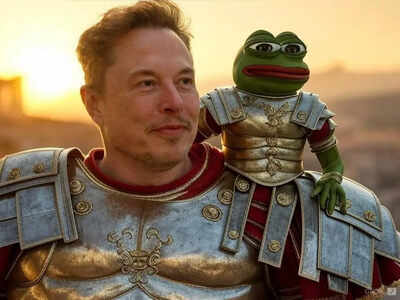- News
- World News
- US News
- Elon Musk's 'Kekius Maximus' meme coin sparks wild 4,800% surge, is this future of crypto?
Trending
Elon Musk's 'Kekius Maximus' meme coin sparks wild 4,800% surge, is this future of crypto?
Elon Musk’s New Year’s Eve switch to the handle ‘Kekius Maximus’ – a nod to a previously obscure cryptocurrency – triggered an explosive 4,800% increase in the coin’s value, hitting a market cap of $380 million within hours. It’s a familiar story in the meme coin world, where cryptocurrencies inspired by viral memes or cultural moments—like Dogecoin, Shiba Inu, and Pepe the Frog—often soar and crash just as quickly.
Despite the volatility and skepticism from financial experts who liken meme coins to Ponzi schemes, small investors and some large funds have poured millions into these coins, riding massive short-term gains. Market analysts estimate the meme coin sector grew from a $20 billion market cap in January 2024 to over $120 billion by year-end.
Laurent Parmentier, partner at the crypto investment fund Stratos, explained the allure of meme coins, noting that his fund’s performance far outpaced traditional investments. "Crypto is the best performing asset class in the world, and meme coins have been the best performing subsection," Parmentier said, citing 300x returns on investments, reported the New York Post.
Meme coins aren’t just about financial gains; they reflect the growing influence of cryptocurrency and internet culture. Parmentier highlighted the example of a meme coin based on a New York pet squirrel named Peanut, saying, "If you had invested in Peanut, you would have made a lot of money."
A noteworthy example of meme coin success is Kekius Maximus, where one investor turned just $66 into nearly $3 million. In a world of meme coins, rapid returns can make a massive impact.
But meme coins come with risks. The infamous “$HAWK Token,” launched by viral sensation Hailey Welch, saw its value plummet from $490 million on launch to under $40,000 within a month, prompting an investigation by the SEC and a class-action lawsuit from angry investors.
Despite these risks, meme coins are expected to remain a fixture of the crypto space. With figures like Musk driving interest and the potential for meme coins to integrate with technologies like AI, the space is poised for further growth. Some experts even believe meme coins will form a crucial part of the next phase of crypto culture.
Courtland Leer, founder of Plastic Labs, added, "Capital follows attention. Something sticks, and it becomes the seed for the next cycle."
End of Article
FOLLOW US ON SOCIAL MEDIA
Visual Stories
Hot Picks
TOP TRENDING
Explore Every Corner
Across The Globe












